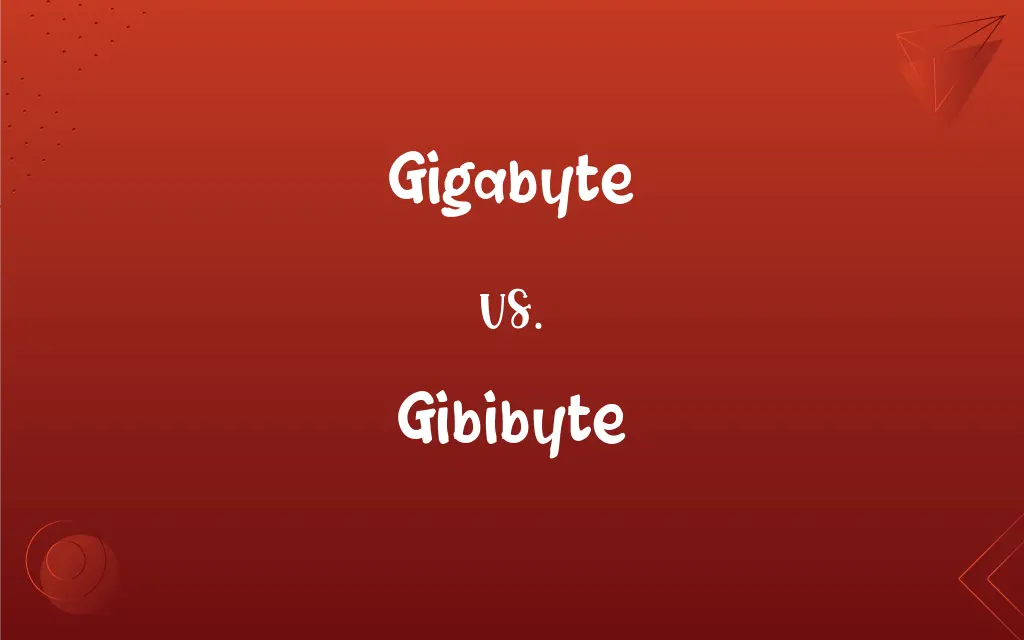Gigabyte vs. Gibibyte: What's the Difference?
By Janet White || Updated on May 22, 2024
A gigabyte (GB) is a unit of digital information equal to 1 billion bytes (10^9), while a gibibyte (GiB) is equal to 1,073,741,824 bytes (2^30), used for precision in computing.

Key Differences
A gigabyte (GB) is a standard unit of digital information storage used in contexts like consumer electronics, where 1 GB equals 1 billion bytes (10^9). This unit is widely adopted in marketing and labeling of storage devices such as hard drives, flash drives, and memory cards.
A gibibyte (GiB), on the other hand, is a unit of digital information storage that equals 1,073,741,824 bytes (2^30). This unit was introduced by the International Electrotechnical Commission (IEC) to provide a more precise measurement than the gigabyte, particularly in computing where binary systems are used.
When it comes to capacity, 1 GiB is approximately 7.37% larger than 1 GB. This difference arises because the gigabyte uses a decimal base (powers of 10), whereas the gibibyte uses a binary base (powers of 2). As a result, storage capacities can appear different depending on which unit is used.
In the context of operating systems and file systems, gibibytes are often used for technical accuracy. For instance, operating systems like Linux and Windows might display disk space in GiB to reflect true binary capacity, avoiding discrepancies seen when using gigabytes.
Consumers often encounter gigabytes in everyday usage, such as in product specifications for smartphones and laptops. However, technical specifications, particularly in the fields of data storage and processing, might prefer gibibytes to ensure precision and avoid confusion.
ADVERTISEMENT
Comparison Chart
Definition
1 billion bytes (10^9)
1,073,741,824 bytes (2^30)
Base System
Decimal (powers of 10)
Binary (powers of 2)
Common Usage
Consumer electronics, marketing
Computing, technical specifications
Relative Size
Smaller
Approximately 7.37% larger
Standardization
Widely used in everyday contexts
Defined by IEC for precision in computing
ADVERTISEMENT
Gigabyte and Gibibyte Definitions
Gigabyte
Commonly found in product specifications.
The USB flash drive is advertised with a capacity of 16 gigabytes.
Gibibyte
Ensures clarity in technical contexts.
The International Electrotechnical Commission standardized the gibibyte.
Gigabyte
Follows the metric system.
One gigabyte is 10^9 bytes.
Gibibyte
Used for precise measurements in computing.
A gibibyte is exactly 2^30 bytes.
Gigabyte
Sometimes less accurate for technical needs.
In computing, a gigabyte might not reflect actual storage capacity.
Gibibyte
Preferred in operating systems and file systems.
The operating system displays disk space in gibibytes.
Gigabyte
A gigabyte equals 1 billion bytes.
This smartphone has 64 gigabytes of internal storage.
Gibibyte
A gibibyte equals 1,073,741,824 bytes.
The software requires at least 2 gibibytes of RAM.
Gigabyte
Often used in consumer electronics.
The hard drive offers 500 gigabytes of space.
Gibibyte
More accurate representation of binary storage.
A gibibyte is approximately 7.37% larger than a gigabyte.
Gigabyte
A unit of computer memory or data storage capacity equal to 1,024 megabytes (230 bytes).
Gibibyte
(computing) Strictly, 230 (10243, or 1,073,741,824) bytes or 210 (1024) mebibytes, as opposed to a gigabyte.
Gigabyte
One billion bytes.
Gigabyte
(SI) 109, one billion (1,000,000,000) bytes. SI symbol: GB
Gigabyte
(computing) A gibibyte or 10243 (1,073,741,824) bytes.
Gigabyte
A unit of information equal to one billion (1,073,741,824) bytes or 1024 megabytes
FAQs
Which is larger, a gigabyte or a gibibyte?
A gibibyte is larger; it is approximately 7.37% larger than a gigabyte.
What is a gigabyte?
A gigabyte (GB) is a unit of digital information equal to 1 billion bytes (10^9).
Why was the gibibyte introduced?
To provide a precise measurement that reflects binary storage in computing.
How does operating system storage reporting differ?
Operating systems often report storage in gibibytes for technical accuracy.
Is 1 GB the same as 1 GiB?
No, 1 GiB is 1,073,741,824 bytes, while 1 GB is 1,000,000,000 bytes.
Who standardized the gibibyte?
The International Electrotechnical Commission (IEC) standardized the gibibyte.
Which unit should I use for technical accuracy?
For technical accuracy, use gibibytes (GiB).
What is a gibibyte?
A gibibyte (GiB) is a unit of digital information equal to 1,073,741,824 bytes (2^30).
How do gigabytes and gibibytes differ?
Gigabytes use a decimal base (10^9), while gibibytes use a binary base (2^30).
Where are gigabytes commonly used?
Gigabytes are commonly used in consumer electronics and marketing.
Where are gibibytes commonly used?
Gibibytes are used in computing and technical specifications for accuracy.
Why might there be confusion between GB and GiB?
The similar names and different base systems can cause confusion.
Can I convert gigabytes to gibibytes?
Yes, 1 GB is approximately 0.93 GiB.
What does 500 GB translate to in GiB?
500 GB is approximately 465.66 GiB.
Why do technical documents prefer gibibytes?
They provide a more precise and accurate representation of binary storage.
How do manufacturers label storage capacity?
Manufacturers often label storage capacity in gigabytes (GB).
Do all software applications use gibibytes?
Not all; some applications still use gigabytes, which can cause discrepancies.
Why do storage devices use gigabytes in marketing?
Gigabytes align with the metric system, making them easier for consumers to understand.
What is the importance of using the correct unit?
Using the correct unit ensures accurate communication and understanding, especially in technical contexts.
Is the use of gibibytes becoming more common?
Yes, especially in technical and computing fields for clarity and precision.
About Author
Written by
Janet WhiteJanet White has been an esteemed writer and blogger for Difference Wiki. Holding a Master's degree in Science and Medical Journalism from the prestigious Boston University, she has consistently demonstrated her expertise and passion for her field. When she's not immersed in her work, Janet relishes her time exercising, delving into a good book, and cherishing moments with friends and family.































































